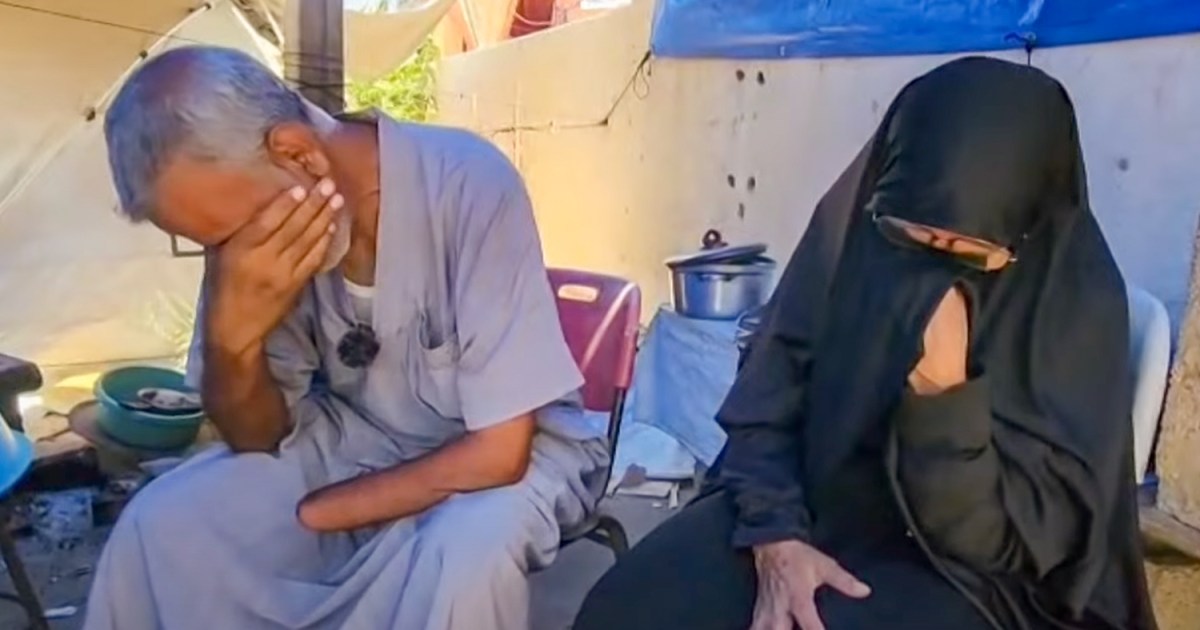An increasing number of Palestinian families are constantly looking for information about relatives who traveled dangerously far to get food from aid distribution points before never coming back as a result of Israel’s forced starvation tightening its grip on Gaza’s entire population.
Khaled Obaid has been searching for Ahmed, his beloved son, for two months, trying to find him in Deir-el-Balah through every passing car, hoping that one of them will find him.
The boy had traveled to the Zikim crossing point, where aid trucks enter northern Gaza, to find food for his parents and sister, who had lost her husband during the war, and had left the displaced family’s tent in the center of the town.
“He hasn’t come back until now,” he said. He left because he needed food. The distraught father broke down in tears with his wife as they were sheltered beneath the blue tarpaulin, telling Al Jazeera, “We have nothing to eat.”
Khaled broke radio silence by reporting his son’s disappearance to the International Committee of the Red Cross and every other official organization he could contact. He has not received any updates regarding Ahmed’s whereabouts to this day.
In order to access food from Gaza Humanitarian Foundation (GHF) sites, the largely displaced population has to choose between starvation and enduring the bullets fired by Israeli soldiers and American security contractors. The United Nations and human rights organizations refer to these distribution points as “human slaughterhouses” and “death traps.”
Nearly 1,400 people have died at the aid sites since the Israeli army first started operations in late May and along food convoy routes as a result of the life-or-death gamble, according to UN data released last week. Without excluding Ahmed’s count of the untold number of aid seekers who are still missing,
First-person accounts of people who went missing in Gaza have been gathered by human rights monitors, who later discovered their bodies were being murdered.
According to Maha Hussaini, head of media at the Euro-Med Human Rights Monitor, “in many cases, those who went missing are apparently killed near the aid distribution points, but their bodies remained unreachable.”
“Many Palestinians left their homes with nothing but a bag of flour,” they said. According to Tareq Abu Azzoum, an Al Jazeera correspondent from Deir-el-Balah, “many never returned.” The line between surviving and disappearing in Gaza is now tragically thin.
Famine is roiling the area as the number of aid seekers who have been missing rises. Over 80 adults have reportedly died from starvation in the last five weeks alone, and 93 children have been a victim of man-made malnutrition since the war started.
Since Israel eased restrictions on Gaza on July 27, an average of 84 trucks have reportedly entered the beleaguered enclave each day. However, according to aid organizations, at least 600 aid trucks must be driven each day to meet the region’s basic requirements.
The “Death circle”
Prime Minister Benjamin Netanyahu appeared to double down on his war goals on Monday in the midst of growing international outcry over the widespread starvation that was viewed by many as being intentionally orchestrated by Israel.
Netanyahu said he would hold a cabinet meeting on Tuesday to ensure that “Gaza will no longer pose a threat to Israel.” An official who claimed Netanyahu was easing the offensive, according to a source who was cited by Israel’s Channel 12
According to medical sources, 36 aid seekers have been killed in Israeli attacks since dawn on Monday, making the announcement come on a new bloody day in the Strip.
According to Al-Aqsa Martyrs Hospital, at least three people were killed when an Israeli bomb targeted a home in Deir el-Balah.
Seven people were killed in Israeli shelling of various locations in the Shujayea neighborhood, east of Gaza City, according to a source at al-Ahli Hospital in Gaza City.
In northern Gaza’s Beit Lahiya bombing, according to emergency services, two people were killed.
A nurse at Deir el-Balah was fatally struck by an airdropped box of aid, according to reports on Monday.
The UNRWA head of UNRWA, Philippe Lazzarini, described the dangerous airdrops as a “distraction” and “smokescreen.”
UNICEF issued a warning on Monday that 28 children, essentially an entire “classroom,” are per day a victim of Israeli bombardment and lack of assistance.
“Gaza’s children require protection, food, and water. They need a ceasefire right away, according to the UN agency on X, more than anything.
Bombardments cause death.
Death from starvation and malnutrition.
Death as a result of inadequate assistance and services.
28 children, or 28 times the number of students killed each day in Gaza, are killed on average, which is the equivalent of a classroom.Children in Gaza require protection, food, and water. They require a picture more than anything. Twitter.com/QIQQ6IAoG
The Palestinian Foreign Ministry demanded that the UN Security Council “assume its responsibilities” by imposing a ceasefire immediately in Gaza, making an official visit there, and supporting calls for a two-state solution at a recent UN conference in New York.
Source: Aljazeera

Leave a Reply